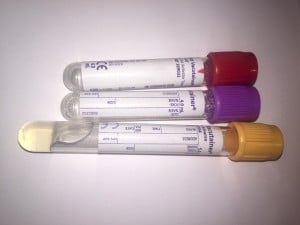So 9 year-old “Scruffy” has had her annual check and you’ve been told by your caring vet that she has some dental disease that needs addressing. There are a fair few chunks of tartar clinging to her teeth and her gums are looking pretty inflamed – the explanation for why she’s had a distinctive “eau de poof” fragrance over the last few months…. Your vet explains that the procedure involves an anaesthetic and gives you an estimate of what the costs may be. And she’s recommended something else too: Pre-Anaesthetic Blood Tests. Really? For a pet?
Why would your vet recommend Pre-Anaesthetic Blood Tests?
Well, anaesthetics are medications that often have profound effects on consciousness (expected and desired that the pet is asleep) but also on the cardiovascular system and blood pressure, respiration, liver and kidney function. As with humans, many senior pets (those over seven years old) may start to have problems with joints, heart health, kidneys or liver function.
Many of these conditions may develop gradually over many months with few if any clinical signs seen before substantial damage has occurred. Really? Yes! Up to 75% of kidney function is lost before a pet will start showing clinical signs like drinking and urinating more. This is good news and bad news. The bad news is that once the 75% of function is lost, it’s lost and the condition needs to be managed carefully. The good news is that we do have tools to detect kidney and other organ disease before your pet has reached the “severe” stage with clinical signs. One of these tools is using blood tests to detect changes in enzyme and hormone levels associated with organs that may indicate that disease is present.
This means that if 9 year-old “Scruffy” has an underlying issue like kidney disease developing and she has a blood test before an anaesthetic, her vet is better able to manage her condition and modify the usual anaesthetic protocol or even postpone the anaesthetic if the risk to her health is considered severe.
So only ‘old’ pets need Pre-Anaesthetic Blood Tests? Right? WRONG!
The vast majority of young pets will happily undergo an anaesthetic and recover normally. There are still some however, that appear completely happy and healthy on physical exam, yet have an underlying condition which may become serious if exacerbated by an anaesthetic. Certain breeds or races of pets may be more predisposed to certain conditions and if you are aware of an issue in your pet’s family history, it’s definitely worth discussing with your vet before she undergoes an elective procedure.
What is tested in a Pre-Anaesthetic Blood Test?
Specific panels of blood tests vary from facility to facility, however pre-anaesthetic panels generally look for problems with kidney function, liver function, blood glucose and haematocrit (the number of red blood cells). Depending on your pet’s general health and these results, your vet may recommend other tests in addition.
So, do I need to be really scared about my pet having an anaesthetic?
NO, but if you do have any concerns you should discuss them with your vet so that you are aware of why your pet needs an anaesthetic as well as the risks involved. Essentially, the more information your vet has at her disposal before giving your pet an anaesthetic, the better she is able to plan for and manage the anaesthetic during a procedure.
If you would like any more information or would like to book an appointment to get your pet checked out, please call 0481 527 678 or email us. We’ll be happy to help!


